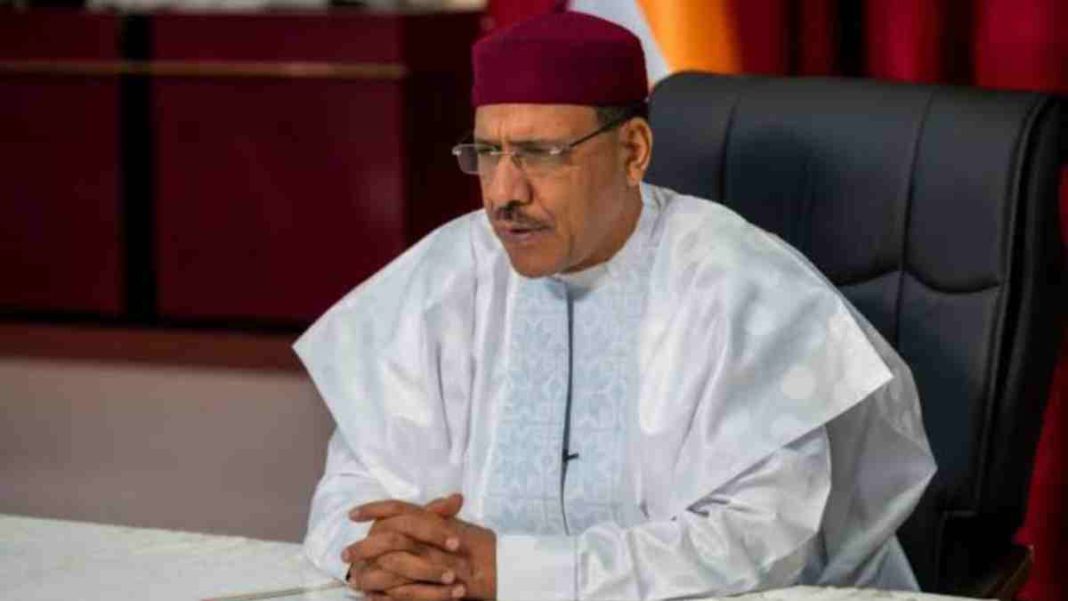NIGERIA: Mohamed Bazoum, the Nigerian President, has been ousted from power, according to a group of soldiers who appeared on national television late on Wednesday, hours after the president was held in the presidential palace.
Reading from a prepared statement, Colonel Amadou Abdramane, surrounded by nine other officers, declared that the defence and security forces had made the decision to “put an end to the current regime” due to the worsening security situation and issues with governance.
Abdramane stated that Niger has closed its borders and imposed a nationwide curfew while also suspending all institutions of the republic.
The soldiers have issued a caution against any foreign intervention, assuring that the wellbeing of President Bazoum will be respected.
This military takeover, the seventh in the West and Central Africa region since 2020, could pose additional challenges for Western countries seeking to assist the Sahel region in combating the spread of a jihadist insurgency originating from Mali over the last decade.
Niger, a landlocked country and former French colony, has emerged as a crucial partner for Western powers in their efforts to combat insurgencies. However, tensions have been escalating with the new ruling juntas in Mali and Burkina Faso, causing strain in their relationships.
Niger is an essential ally of the European Union in the joint mission to address irregular migration from sub-Saharan Africa.
France relocated troops from Mali to Niger last year after its relations with the interim authorities soured. Likewise, due to similar tensions, France has withdrawn its special forces from Burkina Faso.
Bazoum’s election marked the first instance of a democratic transfer of power in a nation that had experienced four military coups since gaining independence from France in 1960.
The United States revealed that it had invested approximately $500 million since 2012 to support Niger in enhancing its security efforts. Additionally, Germany declared in April its participation in a three-year European military mission focused on enhancing the country’s armed forces.
“Bazoum has been the West’s only hope in the Sahel region. France, the U.S., and the EU have spent much of their resources in the region to bolster Niger and its security forces,” Ulf Laessing,who heads the Sahel programme for Germany’s Konrad-Adenauer-Stiftung think-tank, said.
On Wednesday, General Omar Tchiani and the presidential guards took control of the presidency, leading to concerns among regional leaders who quickly organised a mediation mission to prevent a coup.
Recent frustrations over the government’s failure to prevent violent attacks on towns and villages have contributed to a rise in coup attempts in the region. Since 2020, Mali and Burkina Faso have each experienced two coups, and Guinea witnessed a junta seizing power in 2021, leading to instability in a region that was gradually shedding its reputation as a “coup belt.”
In March 2021, Niger faced a thwarted coup attempt when a military unit tried to seize the presidential palace just days before the inauguration of the newly elected President Bazoum.
The African Union and ECOWAS, the West African regional bloc, jointly condemned the recent events, referring to them as an attempted coup d’etat.
On Wednesday afternoon, Benin’s President, Patrice Talon, travelled to Niger to assess the situation after holding a meeting with Nigeria’s President and ECOWAS Chairman, Bola Tinubu.
“All means will be used, if necessary, to restore constitutional order in Niger, but the ideal would be for everything to be done in peace and harmony,” Talon told journalists in Abuja, Nigeria’s capital.
The United States called for the release of Bazoum, while the European Union, United Nations, France, and other entities condemned the uprising, expressing their deep concern over the unfolding events.
U.S. Secretary of State Antony Blinken had a conversation with Bazoum while he was being held in the presidential palace on Wednesday. Blinken underscored that the U.S. economic and security partnership with Niger relied on the continuation of democratic governance.
Also Read: Seven People, Including Two Nigerians Arrested on Charges of Drug Trafficking



